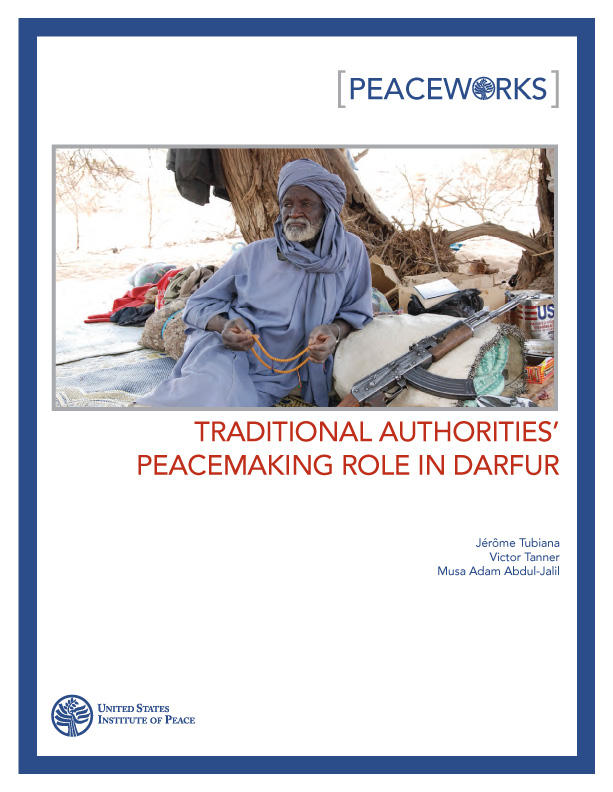Traditional Authorities’ Peacemaking Role in Darfur
As broader peace efforts have faltered, the international community has increasingly focused on the capacity of local communities in Darfur to regulate conflict in their midst. This report examines the traditional justice system in Darfur and points to challenges facing traditional authorities, as well as how the system has adapted and evolved during the years of violent conflict.

Summary
- The violence in Darfur is simultaneously a crisis of governance and a problem of law and order.
- The Native Administration is a century-old and evolutive system of traditional leaders that underpins the traditional justice sector.
- Traditional justice and statutory law are and have long been intertwined, but the terms of the exchange have changed.
- The Native Administration has been compromised, disempowered, and delegitimized.
- Many courts have been shut down by either the government or the rebels.
- The war has made it harder for traditional mechanisms to resolve disputes across tribal lines.
- Affiliation to tribe and party are necessary for both survival and success.
- As broader peace efforts have faltered, interest has increased in the capacity of local communities to regulate conflict in their midst.
- Darfurians believe that the first step in addressing a conflict should be a mediation and that the government should be the last resort.
- Traditional justice mechanisms are evolving rather than disappearing.
- Judiya is the main reconciliation and justice mechanism.
- The ajawid are elders or notables from a family, clan, or tribe not involved in the dispute. Government officials and judicial officers can serve. Neutrality is key.
- The principle of judiya is that all sides agree to abide by the recommendations before hearing them. If one party is dissatisfied, the ajawid may decide to review their decisions.
- Reconciliation is a central component of judiya and involves buy-in from both sides.
- The chief element in acknowledging responsibility is collective payment of compensation.
- Darfurians favor judiya over the courts in part because it is faster and in part because it is more free of governmental interference.
- Darfurians want the government to endorse and support reconciliation, but not to vet or control it.
About the Report
The violence that has raged in Darfur for a decade is both a crisis of governance and a problem of law and order. As broader peace efforts have faltered, interest has increased in the capacity of local communities in Darfur to regulate conflict in their midst. All hope that traditional leaders, working within the framework of traditional justice, can be more successful in restoring some semblance of normalcy and security to Darfur. This report outlines the background to the conflict and the challenges in resolving it.
About the Author
Victor Tanner has worked with war-affected populations in Africa, the Middle East, and the Balkans, both as an aid worker and a researcher, for more than twenty years. He first lived and worked in Darfur in 1988. Since 2002, he has conducted field research on local social and political dynamics in the Darfur conflict, visiting many parts of Darfur and eastern Chad as well. He speaks Sudanese Arabic. Jérôme Tubiana is an independent researcher specializing in Darfur, Sudan, and Chad, where he has worked as a consultant for various humanitarian organizations and research institutions, International Crisis Group, the Small Arms Survey, USIP, USAID, and AU-UN institutions. He is the author or coauthor of various articles, studies, and books, notably Chroniques du Darfour (2010). He holds a doctorate in African studies.



